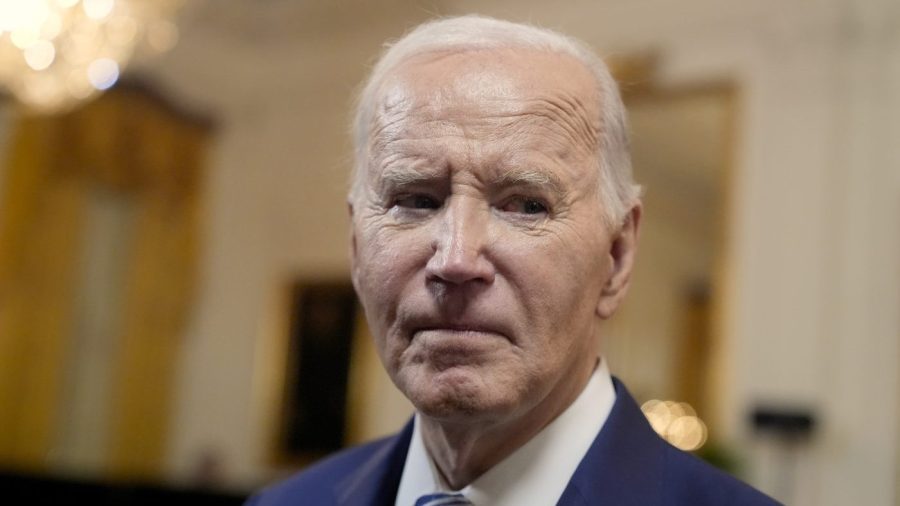
President Biden, on his way out the door, has permanently put over 625 million acres of federal waters off-limits to oil and gas exploration. This is the move of a spiteful old man eager to undercut one of the highest priorities of his successor, President-elect Donald Trump: U.S. energy development.
It is also a desperate pitch to post an asterisk next to his name in the record books; yes, Biden is one of the most unpopular presidents of all time, but at least, as noted in the White House statement accompanying the move, “President Biden will have conserved more lands and waters than any other U.S. president in history.” Please take note, presidential historians.
Reducing acreage available for oil and gas exploration is a profoundly ignorant and damaging measure. As the world races toward broad-based adoption of artificial intelligence, advanced semiconductor manufacturing, cryptocurrencies and other new technologies, every country is vying to have not only scientific superiority but also the massive amounts of cheap electricity that the new industries require.
According to a study from the Bank of America, electricity demand in the U.S. grew by only 13 gigawatts over the last 13 years. But thanks to the growth of energy-intensive industries like AI, demand will soar by a projected 70 GW through 2030. With coal plants being retired, and given the intermittent nature of solar and wind power, the U.S. will likely face “grid stability” concerns. It will also continue to rely heavily on fossil fuels.
Some indication of the potential impact of AI alone comes from Ireland, where electricity to service just that industry’s data centers is projected to soon account for 32 percent of the country’s overall consumption.
The White House, according to critics, has had a “policy blind spot” in its consideration of AI — that is, it’s focusing on the potential merits while overlooking the enormous power needed. I’m not surprised; any realistic recognition of our country’s future power needs exposes the foolishness of Biden’s green energy fixation.
The U.S. has abundant and inexpensive fossil fuels, one of the main attractions for companies choosing to invest here. Our electricity costs are a fraction of what businesses in Europe have to pay, for instance. Prices will remain low only if we continue to exploit oil and gas while also investing in renewables. Denying this enormous competitive advantage, as Biden has done, is reckless.
The legacy media has described the acreage removed from exploration in general terms, noting that offshore production (mainly in the Gulf of Mexico) accounts for only about 14 percent of today’s oil production and 2 percent of our gas output. That is true, but what they are hiding from voters is that a substantial amount of our undiscovered oil and gas reserves lie offshore in those protected areas.
The federal Bureau of Land Management estimates that there are 89.9 billion barrels of oil and 327.5 trillion cubic feet of gas yet to be discovered on the U.S. Outer Continental Shelf. They acknowledge that their estimates are out of date; environmentalists have blocked seismic surveying of unexplored acreage offshore the East Coast, even though such analysis is not damaging — not nearly as problematic, for instance, as allowing the construction of offshore wind towers, which the White House has happily embraced.
Not only are there significant reserves to be discovered offshore, production from subsea wells is less environmentally damaging than wells drilled onshore. As reported in the New York Times last year, “The greenhouse gas emissions associated with extracting a barrel of oil from the Gulf of Mexico are as much as a third lower than emissions from producing a barrel of oil from fields on U.S. soil.”
The White House statement says, “President Biden has determined that the environmental and economic risks and harms that would result from drilling in these areas [‘the entire U.S. East coast, the eastern Gulf of Mexico, the Pacific off the coasts of Washington, Oregon, and California, and additional portions of the Northern Bering Sea in Alaska’] outweigh their limited fossil fuel resource potential.” I doubt Biden has a firm grip on either the risks or the potential of drilling in these regions. The last time we had a major offshore accident was 2010. Since then, the industry has developed better safety protocols.
Meanwhile, the potential is huge. While there has been scant interest in much of the designated acreage up until now, the Financial Times notes that “ClearView Energy Partners, a consultancy, said the ban in the eastern Gulf of Mexico would affect about 40 percent of undiscovered economically recoverable oil and gas resources in the US outer continental shelf.”
Ron Neal, chairman of the Independent Petroleum Association of America Offshore Committee, described Biden’s move as “significant and catastrophic,” saying further, “It represents a major attack on the oil and natural gas industry.”
Biden’s decision is especially short-sighted in that the U.S. is benefiting from a surge in investment coming from foreign companies, eager to take advantage of an expected easing of regulatory zeal under President-elect Trump as well as low energy costs. Friends in the private equity world who traveled abroad recently looking for funds and for possible investments after the election found most business managers wanting to invest in the U.S.
In recent days, Trump announced that an Emirati property developer, Hussain Sajwani, is pledging $20 billion to build new data centers in the U.S. That comes on top of Softbank CEO Masayoshi Son, an AI enthusiast, promising in December to invest $100 billion in U.S., creating 100,000 jobs over the course of Trump’s four-year term.
Voters should be furious about Biden’s efforts to permanently ban most drilling offshore. A majority of the country elected Donald Trump, who campaigned on a promise to “Drill, baby, drill.” They get what’s at stake, even if Joe does not.
Liz Peek is a former partner of major bracket Wall Street firm Wertheim and Company.












